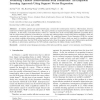Free Online Productivity Tools
i2Speak
i2Symbol
i2OCR
iTex2Img
iWeb2Print
iWeb2Shot
i2Type
iPdf2Split
iPdf2Merge
i2Bopomofo
i2Arabic
i2Style
i2Image
i2PDF
iLatex2Rtf
Sci2ools
113
click to vote
JCST
2008
2008
Predicting Chinese Abbreviations from Definitions: An Empirical Learning Approach Using Support Vector Regression
In Chinese, phrases and named entities play a central role in information retrieval. Abbreviations, however, make keyword-based approaches less effective. This paper presents an empirical learning approach to Chinese abbreviation prediction. In this study, each abbreviation is taken as a reduced form of the corresponding definition (expanded form), and the abbreviation prediction is formalized as a scoring and ranking problem among abbreviation candidates, which are automatically generated from the corresponding definition. By employing Support Vector Regression (SVR) for scoring, we can obtain multiple abbreviation candidates together with their SVR values, which are used for candidate ranking. Experimental results show that the SVR method performs better than the popular heuristic rule of abbreviation prediction. In addition, in abbreviation prediction, the SVR method outperforms the hidden Markov model (HMM). Keywords statistical natural language processing, abbreviation prediction,...
Related Content
| Added | 13 Dec 2010 |
| Updated | 13 Dec 2010 |
| Type | Journal |
| Year | 2008 |
| Where | JCST |
| Authors | Xu Sun, Houfeng Wang, Bo Wang 0003 |
Comments (0)

